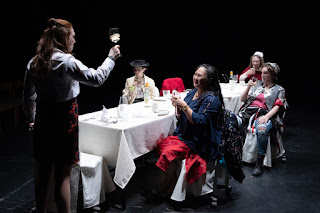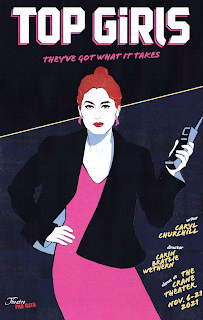The play opens at a dinner party. A long elegant table is set up in the middle of the performance space at the Crane, with audience seating on both sides. We learn that the party is to celebrate Marlene's big promotion at the employment agency where she works, but it's soon clear from the varied dress and style of the guests that this is not a normal party. This is a dinner party with the "top girls" of history and legend: 19th century British explorer Isabella Bird, 13th century Japanese author Lady Nijo, 9th century female pope (believed to be legend only, but who really knows) Pope Joan, and a couple of figures from European legends - warrior Dull Gret and Patient Griselda, the most obedient wife. This is quite a collection of fascinating women, and each one of them could be a play (or a Netflix series) unto themselves. Instead we get just a snippet of each as they interact and tell their stories, the similarities and differences between them. All of the women talk over each other in a wonderfully confusing cacophony of dialogue (reminding me of being at an actual dinner party when several conversations are going on around you and you're not sure which to listen to). We've come a long way, baby, but have we really?
 |
| working women (Megan Kim, Nissa Nordland Morgan, and Maggie Cramer, photo by Alex Wohlheuter) |
 |
| dinner party! (photo by Alex Wohlheuter) |
The bold '80s business attire is spot on, a contrast to the rest of Marlene's family and the period costumes of the party guests. The office chairs and tables cleverly transform into other purposes in home or dining room locations. Best of all is the fun '80s music playing before the show and at intermission. We love the '80s, right? (Set design by MJ Leffler, costume design by Eleanor Schanilec, sound design by Charlotte Deranek.)
This play is kind of like Mad Men, but set in the '80s instead of the '60s, and with women (although I always believed that Mad Men is really about the women). Like Mad Men, Top Girls really digs into the truth behind the facade of the decade that looked glossy and happy on the surface. But at what cost? Particularly for the women who are trying to fit into the expected mold, and the women whose work to support the glossy image goes unnoticed and unappreciated. As the director notes in the program, "Top Girls challenges the idea that succeeding in the existing societal structures of a capitalist patriarchy is actually true success. In a combination of hope and despair Churchill asks what happens to those who don't make it to the top?"
Top Girls continues through November 21 at the Crane Theater in Northeast Minneapolis (click here for info and tickets).

